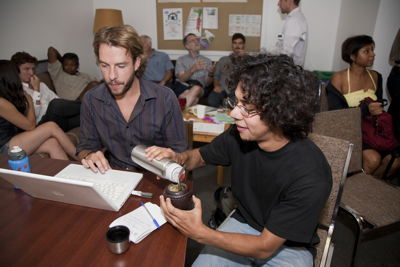A homegrown issue: Students dig into food systems

In professor Satoshi Ikeda’s ideal world, the herb seasoning on the zaatar wraps at Al-Taib would be locally sourced and organically produced.
Unused green space at Loyola would be converted to farmland, where students would develop a connection to the land and learn to cultivate wheat and other crops for the university’s cafeterias.
Members of the university community would deepen their understanding of food systems on campus and further afield by being involved in the process.
Under the guise of the Concordia Food Systems Project, a team of concerned students, interns and faculty spent the summer studying our food production, distribution and consumption patterns.
“Food is the basis for life yet we have neglected it so much. We are so detached from nature and the farmers who produce our food,” says Ikeda, Canada Research Chair in Political Sociology of Global Futures in the Department of Sociology and Anthropology. He teaches courses on globalization and the political economy of food, and participates in the student-led Food Systems Project initiated by Sustainable Concordia and the Concordia Student Union. Ikeda offered the summer internship course which followed the model of problem-based service learning.
Project coordinator and former sociology student Cameron Stiff says we have the opportunity to be leaders in the field. “Getting students out there, growing food, talking about food, working with communities and building a more engaged academic environment – I think that’s the future of education and I’m thrilled that Concordia is embracing it,” he says.

Their aim is to create a dialogue about food and make policy recommendations to improve food sustainability. Concordia’s own environmental policy, passed by the Board of Governors in Oct. 2007, states that the university is “committed to responsible environmental stewardship through all the university’s activities and functions.”
The team is looking into fundamental questions like: Who sells food? What policies guide food purchases? Where does food come from? Is it safe and healthy? How much does food cost? How are food wastes processed?
Members of the administration have praised the ideas proposed so far and are receptive to new projects. A group of students are working with Alex Oster, former CSU VP Sustainability, to develop a business plan to transform Loyola’s Hive Café into a student-run, sustainable eatery. Others have been busy comparing Concordia’s food system to six other post-secondary institutions including Yale and McGill. A new tea garden has been planted to supply local organic teas (see related story for more).
Find out more about the Concordia Food Systems Project, their various initiatives and the Harvest Festival on Sept. 15.